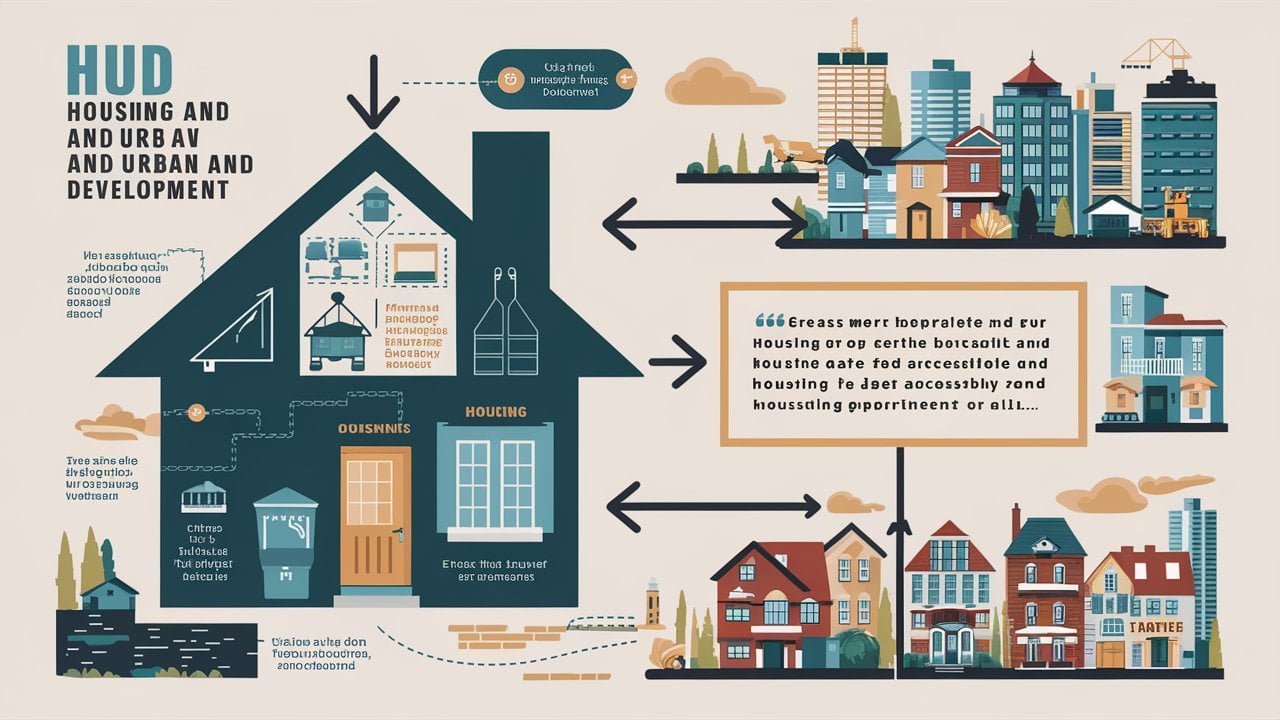Within the intricate framework of housing policy and urban development, the Housing and Urban Development (HUD) agency stands as a cornerstone of governance and regulation.
HUD, established in 1965, plays a pivotal role in shaping the landscape of affordable housing programs, homeless assistance initiatives, and fair housing enforcement within the United States.
Understanding the multifaceted functions of HUD is crucial for real estate professionals, government officials, policy makers, and urban planners tasked with navigating the complexities of housing governance.
Importance of comprehending HUD’s mechanisms becomes increasingly pronounced as policymakers seek to devise effective strategies that address pressing housing challenges. From fostering sustainable communities to ensuring equitable access to affordable housing opportunities, HUD’s impact resonates across diverse segments of society.
By unraveling the nuances of HUD’s operations and influence on the housing market, stakeholders gain profound insights that pave the way for informed decision-making in crafting inclusive and resilient urban habitats.
Join us as we delve into the intricate web of HUD’s responsibilities, shedding light on its indispensable role in shaping housing policies for a brighter future.
Role of HUD in Housing.
The Department of Housing and Urban Development (HUD) plays a pivotal role in the administration and oversight of affordable housing programs in the United States.
Through various initiatives such as the Public Housing Program and Housing Choice Voucher Program, HUD works to ensure that low-income individuals and families have access to safe, decent, and affordable housing options.
By setting guidelines, providing funding, and monitoring compliance, HUD helps to maintain a fair and efficient system that addresses the housing needs of vulnerable populations.In addition to administering affordable housing programs, HUD also provides crucial support for homeless assistance programs across the nation.
Through initiatives like the Continuum of Care program and Emergency Solutions Grants, HUD collaborates with local governments, non-profit organizations, and community stakeholders to address homelessness by offering shelter, supportive services, and resources aimed at preventing individuals from falling into homelessness.
This multi-faceted approach underscores HUD’s commitment to tackling the complex issue of homelessness through comprehensive strategies.
Furthermore, HUD is responsible for regulating and enforcing fair housing laws to prevent discrimination in housing markets based on factors like race, color, religion, sex, disability, familial status, or national origin. By enforcing laws such as the Fair Housing Act, HUD ensures that all individuals have equal access to housing opportunities without facing discriminatory barriers.
Through education campaigns, investigations of complaints, and collaboration with enforcement agencies at federal, state, and local levels; HUD strives to create inclusive communities where everyone has a fair chance at securing quality housing options.
HUD’s Impact on Housing Market.
HUD plays a significant role in shaping the housing market through its influence on various rental assistance programs. By providing subsidies to eligible individuals and families, HUD ensures that low-income households can access affordable housing options.
For example, the Housing Choice Voucher Program, administered by HUD, enables participants to choose their housing while subsidizing the rent to make it more affordable. This initiative not only assists individuals in securing stable housing but also fosters economic stability within communities by reducing the risk of homelessness.
Moreover, HUD promotes sustainable communities by offering grants and initiating programs that aim to enhance the quality of neighborhoods while addressing environmental concerns.
Through initiatives like the Sustainable Communities Regional Planning Grant Program, HUD encourages integrated planning approaches that prioritize affordability, accessibility, and sustainability in urban development projects.
By supporting green infrastructure and energy-efficient practices, HUD contributes to creating environmentally conscious and resilient communities that can withstand challenges like climate change and natural disasters.
In addition to its active involvement in rental assistance programs and sustainable community initiatives, HUD continuously monitors and reports on housing market trends to inform policymakers, stakeholders, and the general public about critical developments.
By analyzing data related to housing affordability, homeownership rates, mortgage lending patterns, and demographic shifts, HUD provides valuable insights that guide decision-making processes at local, state, and national levels.
This monitoring function helps identify emerging issues within the housing sector promptly, allowing for proactive responses to changing market dynamics for a more sustainable and inclusive housing environment.
Benefits of HUD Programs.
HUD programs play a pivotal role in improving access to affordable housing for low-income individuals. By offering subsidies and vouchers, such as the Section 8 Housing Choice Voucher program, HUD helps bridge the gap between rent prices and what low-income families can afford, enabling them to secure decent housing in the private market.
This assistance not only provides stability for these households but also contributes to reducing homelessness and supporting community integration.
Furthermore, HUD funding significantly contributes to enhancing urban infrastructure. Through initiatives like the Community Development Block Grant (CDBG) program, cities receive vital resources for projects aimed at strengthening neighborhoods, fostering economic development, and improving overall quality of living conditions.
These funds are essential in revitalizing neglected areas, constructing affordable housing developments, and addressing infrastructure needs that benefit residents across diverse socio-economic backgrounds.
In addition to bolstering access to housing and improving community infrastructure, HUD plays a vital role in upholding quality and safety standards in public housing units. Through rigorous inspection protocols and maintenance requirements, HUD ensures that subsidized properties meet health and safety criteria while providing habitable living spaces for residents.
By establishing these benchmarks for public housing managers and landlords participating in HUD programs, the agency safeguards tenants from substandard living conditions while promoting accountability within the housing sector.
Challenges Faced by HUD.
Efficient allocation and management of budget resources stand as a significant challenge for the Department of Housing and Urban Development (HUD). With a myriad of programs under its purview aimed at providing affordable housing, ensuring that resources are utilized optimally and transparently is essential.
For example, in the past, HUD has faced criticism for inefficiencies in program implementation resulting from inadequate budget allocations. This challenge highlights the importance of strategic financial planning within HUD to maximize outcomes while minimizing waste.
Addressing homelessness with limited resources presents another daunting task for HUD. As the agency responsible for coordinating federal homelessness assistance programs, HUD must navigate complex socio-economic factors to provide support effectively.
For instance, initiatives like the Continuum of Care program require careful resource allocation to address the specific needs of various homeless populations, including veterans, families, and individuals experiencing chronic homelessness.
This challenge underscores the critical role played by HUD in collaborating with local communities and stakeholders to tackle homelessness comprehensively.
Balancing the demands of diverse stakeholders within the housing sector poses a multifaceted challenge for HUD. From developers seeking regulatory clarity to advocacy groups pushing for fair housing practices, navigating conflicting interests requires finesse and diplomacy.
An illustrative example is HUD’s role in setting guidelines for fair housing laws where it must mediate between landlords’ rights and tenants’ protection from discrimination. This challenge emphasizes the need for HUD to engage in inclusive dialogue with stakeholders to craft policies that align with diverse needs while upholding equity principles in housing access and affordability.
Future Outlook for HUD.
As Housing and Urban Development (HUD) continues to play a pivotal role in shaping housing policies and programs, the future outlook involves potential reforms aimed at enhancing efficiency and effectiveness.
By streamlining processes, improving resource allocation, and implementing technological advancements, HUD can navigate challenges more adeptly to better serve the communities in need of housing assistance. Embracing innovative solutions and best practices will be instrumental in refining HUD’s operations.
Furthermore, as climate change poses growing threats to housing infrastructure and stability, HUD is positioned to address emerging challenges such as climate change resilience in housing.
By integrating sustainable design principles, energy-efficient solutions, and disaster preparedness measures into its initiatives, HUD can contribute significantly to enhancing the durability and sustainability of housing projects across the nation.
Additionally, by emphasizing equitable access to housing opportunities for all individuals regardless of background or socioeconomic status, HUD can continue fostering inclusive communities that promote social equity and well-being.
In conclusion, as HUD evolves to meet the changing landscape of housing needs and challenges, its commitment to innovation, sustainability, and inclusivity will be vital in ensuring that every individual has access to safe, affordable housing options.
Through proactive reforms and strategic initiatives geared towards addressing present-day issues like climate change resilience and equitable housing access, HUD remains poised to make lasting impacts on communities nationwide.



